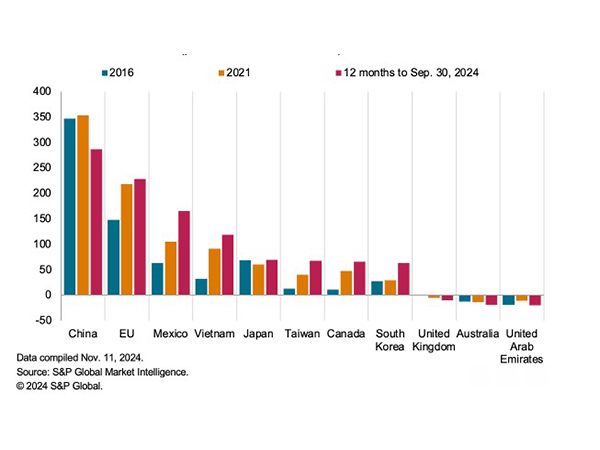Trump's Tariff Strategy Sets Stage for Global Trade Shakeup
Donald Trump's renewed focus on import tariffs is expected to reshape global supply chains, impacting trade with China, Vietnam, and other Asian nations. While risks loom for many countries, India could emerge as a stable player due to its limited US trade exposure and strong economic fundamentals.

- Country:
- India
US President-elect Donald Trump is set to revive import tariffs as a core element of his economic and geopolitical strategy, which analysts warn may spark a new wave of global supply chain reorganization. S&P Global Market Intelligence indicates that this policy, a continuation from Trump's first term, could introduce considerable uncertainty for global trade and supply chain planning.
In his previous term, Trump often cited merchandise trade deficits as justification for trade measures. The US-China trade deficit has decreased by 18.7% since 2021, reaching USD 287 billion by September 30, 2024, yet remains the largest trade imbalance. Countries with increasing trade deficits and existing free trade agreements, like Mexico and South Korea, could face renewed tariff pressures, while Vietnam has become a significant focus, with its US trade deficit surging by 30.6% over the same period.
Further analysis reveals additional risks for countries benefiting from China's reshoring trends. China's trade surplus with Vietnam increased by 25.1% from 2021 to September 2024, equating to an USD 11 billion rise, while the US-Vietnam trade deficit expanded by USD 28 billion. This trend could prompt scrutiny of other Asian nations such as Thailand, Laos, and Cambodia, potentially exposing them to similar tariff risks.
A report by CLSA highlights that amidst this evolving trade scenario, India may remain one of the least affected markets in the region. India's minimal trade exposure to the US, manageable corporate leverage, and reducing foreign equity ownership make it a stable market. The report underscores India's capacity to sustain foreign exchange stability, contingent on steady global energy prices.
Despite the US dollar's strengthening, India's robust economic resilience and domestic investor confidence have mitigated foreign investor outflow impacts, boosting India's appeal as an investment destination. The global shift towards a 'China plus one' supply chain strategy, aimed at reducing dependency on China, presents significant prospects for India.
India's solid macroeconomic fundamentals and role in reshaping global supply chains position it as an attractive destination for future investment flows.
(With inputs from agencies.)
ALSO READ
Rising Tensions: China's Naval Movements Under Scrutiny
India Eyes Stricter Workplace Regulations to Safeguard White-Collar Workers
US Advocates Peaceful Resolution Between India and Bangladesh
China Halts Imports from Poland and Croatia Amid Bluetongue Outbreak
INDIA Bloc Challenges EVM Integrity in Supreme Court










